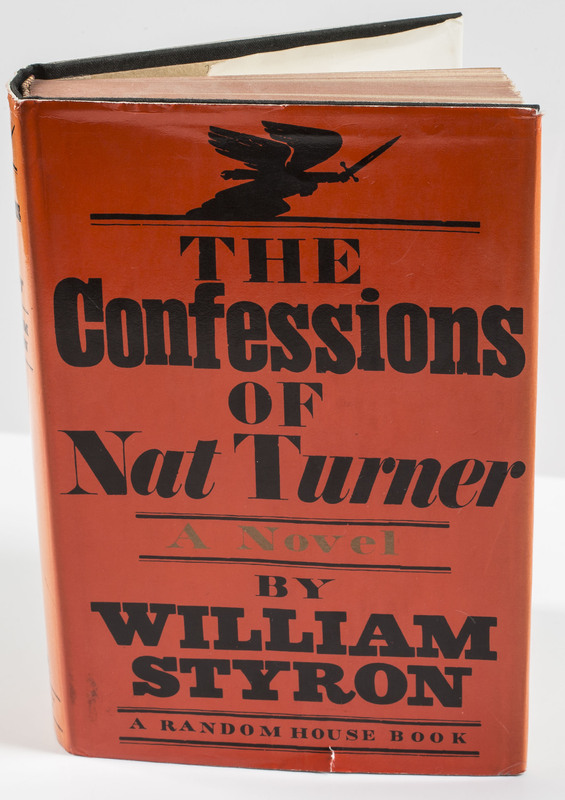 A book that was both lauded and reviled in its day, William Styron’s Confessions of Nat Turner (1967) marks a resurgence of the public debate over Nat Turner’s legacy. Though in the 136 years since the rebellion Turner never vanished from published discourse (as this exhibition aims to illustrate), it was not since the rebellion itself that Turner’s legacy sparked such virulent debate. Published at the height of the Black Power movement, the novel spoke to the current moment and raised the question of Turner as a model of black resistance to white oppression. After winning a Pulitzer Prize for the novel, Styron came under attack for the ways he depicted Turner, on his use and some argued misuse of what he described in a 1993 afterword to the Vintage edition as “an extremely sketchy and mysterious historical record.” He echoes Thomas Gray here, who characterized the rebellion as “wrapt in mystery.” In Styron’s assessment, “our hero was a madman,” but because he “didn’t want to write about a psychopathic monster,” he established “motives, springing from social and behavioral roots.” These motives came under considerable attack.
A book that was both lauded and reviled in its day, William Styron’s Confessions of Nat Turner (1967) marks a resurgence of the public debate over Nat Turner’s legacy. Though in the 136 years since the rebellion Turner never vanished from published discourse (as this exhibition aims to illustrate), it was not since the rebellion itself that Turner’s legacy sparked such virulent debate. Published at the height of the Black Power movement, the novel spoke to the current moment and raised the question of Turner as a model of black resistance to white oppression. After winning a Pulitzer Prize for the novel, Styron came under attack for the ways he depicted Turner, on his use and some argued misuse of what he described in a 1993 afterword to the Vintage edition as “an extremely sketchy and mysterious historical record.” He echoes Thomas Gray here, who characterized the rebellion as “wrapt in mystery.” In Styron’s assessment, “our hero was a madman,” but because he “didn’t want to write about a psychopathic monster,” he established “motives, springing from social and behavioral roots.” These motives came under considerable attack.
The materials here trace the reaction to Styron’s novel, a response that culminated in William Styron’s Nat Turner: Ten Black Writers Respond, published in 1968 by Beacon Press, as well as a protest of Hollywood’s plans to make a film based on Styron’s novel. John Henrik Clarke, whose papers provide most of the material for this section, remarked that “No event in recent years has touched and stirred the black intellectual community more than this book.” With Styron’s novel came a new portrayal of Turner, one that questioned his traditionally defined masculinity. The depiction of Turner as emasculated is largely absent from nineteenth-century accounts, but Styron came under heavy criticism for such a portrayal. In Styron’s novel, Turner is unmarried (though historical evidence indicates he had a wife), and he experiences a homosexual encounter. Perhaps most notably, his lack of participation in the killing is not the result of logistical matters as presented in Gray’s Confessions, but instead because he “was not ready.” Styron’s Turner is not a fearless leader, but instead an impotent one whose manhood, critics charged, is repeatedly called into question.
